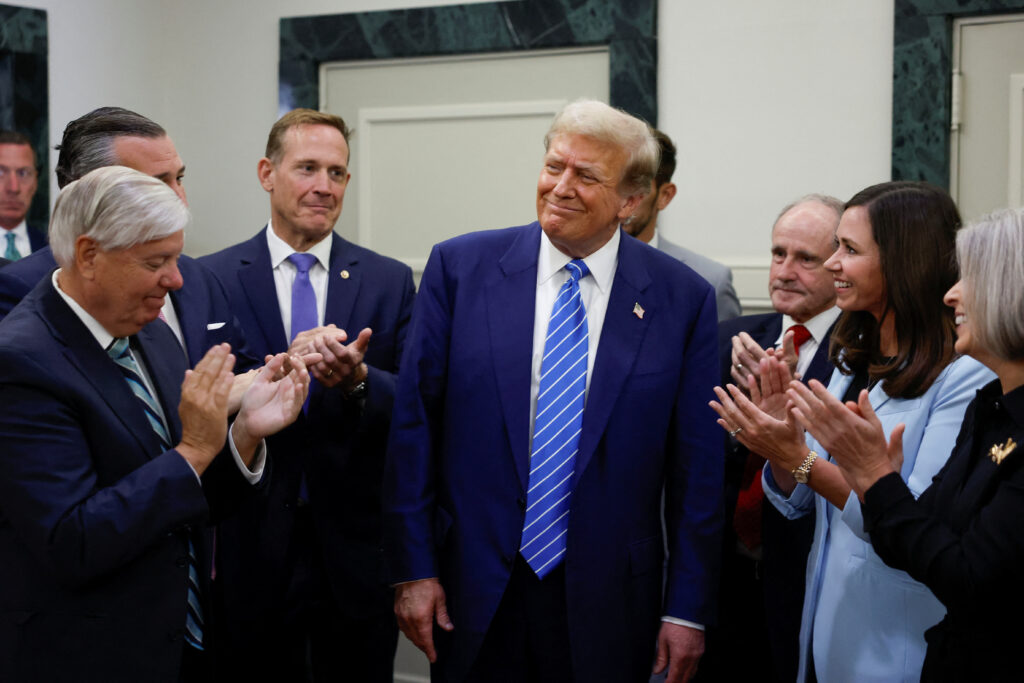Only a few months from the 2024 US election, polls suggest former president and convicted felon Donald Trump will likely return to the presidency, armed with a more confident policy agenda and a more compliant policy team. Trump’s first term was filled with scepticism and alarming rhetoric toward alliances, but little substantive action.
Trump’s foreign policy doctrine is typically characterised as a combination of isolationism and protectionism. The latter is irrefutable, but the former requires some qualification. Trump is indeed wary of US commitments to allies, reluctant to participate in multilateral institutions and highly critical of his Republican predecessors’ military adventurism in Iraq and Afghanistan. But Trump favours unilateral US intervention on many issues.
Foremost among these is competition with China. Trump recently pledged to slap a 60 per cent tariff on all imports from China and heavily implied his commitment to defend Taiwan from Chinese invasion. Trump’s 2017 National Security Strategy was largely an update of the Cold War containment doctrine, directed this time at China. Under a new Trump administration, the United States would likely pressure countries around the world to ‘pick sides’ in the growing US–China rivalry, severing or otherwise blunting their ties to China.
One of Trump’s most consistent policy positions (dating back to at least 1987) is that the US’ allies should pay their ‘fair share’ in exchange for security guarantees. In an April 2024 interview, Trump said of US allies, ‘if you don’t pay, enjoy yourselves, but we’re not going to protect you … We’ve essentially paid for much of their military, free of charge’.
This dovetails with Trump’s blanket economic protectionism. In addition to the 60 per cent tax on Chinese imports, Trump has proposed a 10 per cent minimum rate on goods from all countries, including US allies. Trump may even use US security commitments as leverage, making them conditional on other countries joining the United States in isolating China. Trump sees even cooperative international relationships in zero-sum terms and wants the US to ‘win’ by getting allies to contribute more to collective security.
These two foreign policy strategies — pressuring allies to contribute more while also threatening to withdraw US support — are mutually contradictory and would create perverse incentives for other countries.
On one hand, making US commitments to allies conditional on paying more for defence both reduces the benefits that other states expect to glean from the relationship and raises their fears of abandonment by the United States. These abandonment concerns would only be exacerbated by Trump’s famously unpredictable decisions, his general aversion to alliance commitments, and his propensity to falsely deny that allies’ spending commitments toward joint defence have actually been fulfilled. Indeed, this is already occurring.
On the other hand, pressing them to join the United States in confronting China would force smaller states to place themselves at odds with a rising regional hegemon. Under Trump’s likely foreign policy, other states would face an unpalatable choice.
They can move into an exclusive and asymmetric economic and security relationship with the United States with little assurance that the United States will fulfil its commitments, while also jeopardizing their most important economic relationship and inviting Chinese reprisals.
States can also reject Trump’s terms and start to reduce their dependence on the United States for security, instead moving towards a closer relationship with China. Trump’s policies would generate strong incentives for the second option. If put in the position where their security is at risk and the costs of a US ‘protection racket’ are too high, countries will look to substitute, providing their own security as far as they can, but also transferring any remaining security dependence to China.
How might this play out? Consider the start of Trump’s first term, when he withdrew the United States from the Trans-Pacific Partnership (TPP). The TPP was the centrepiece of former president Barack Obama’s ‘pivot to Asia’ and was to be a mutually-beneficial multilateral institution that would coordinate a large group of countries into alignment with US geopolitical strategy for managing China’s rise.
But with Trump’s withdrawal, the remaining members of the TPP moved to provide for their own interests in the absence of the United States, forming an array of smaller regional deals that often included China, such as the Regional Comprehensive Economic Partnership. They have resuscitated the TPP in a modified form and are even entertaining the possibility of allowing China to join.
In the economic sphere, as US commitments under Trump became more tenuous and its demands more onerous, US partners moved away and closer to China. The same is likely to happen in the security sphere if Trump follows the course he has laid out for his second term.
There are obviously limits to how much current US allies can ‘decouple’ from their longtime patron and pursue their own foreign policy goals despite their dependence on Washington. But the flipside is that there are also limits to how much the United States can afford to withdraw its commitments if doing so would alienate allies and push them into China’s orbit.
Brandon Yoder is Senior Lecturer at the College of Arts and Social Sciences, The Australian National University.
Charles Miller is Senior Lecturer at the College of Arts and Social Sciences, The Australian National University.


If Donald Trump returns to the US presidency in 2024, he is expected to maintain a strict foreign policy marked by isolationism and protectionism, and favouring unilateral US intervention. This policy will likely focus on pushing allies to help the United States isolate China. But strategic contradictions exist as Trump wants US allies to pay their ‘fair share’ in exchange for security guarantees and to apply tariffs on goods from all countries, including US allies.